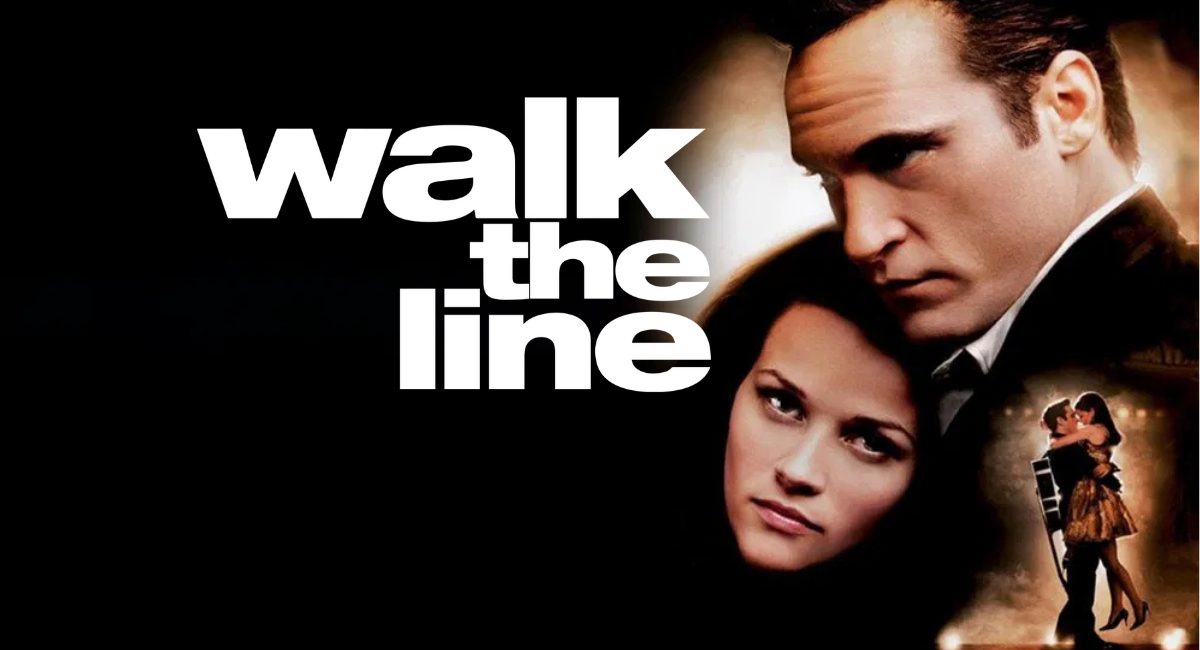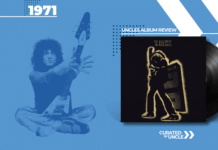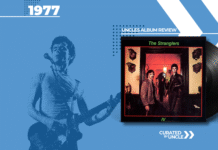Walk the Line (2005): When Johnny Cash Met the Biopic Industrial Complex
Somewhere between a cigarette advert and a guilt trip with a guitar, there lies Walk the Line – a biopic so drenched in earnestness you could wring it out into a bottle and sell it to middle-aged dads for £20. Released in 2005 to critical acclaim and gentle weeping from people who think vinyl sounds “warmer,” James Mangold’s film is a brooding, swaggering tour through the tumultuous life of Johnny Cash, as reimagined by Joaquin Phoenix in a performance so intense it feels like he was method-acting his way through an existential breakdown.
Because nothing says “fun Saturday night” like childhood trauma, opiate addiction and the slow-motion car crash of fame, filtered through enough sepia to make Instagram jealous.
Table of Contents
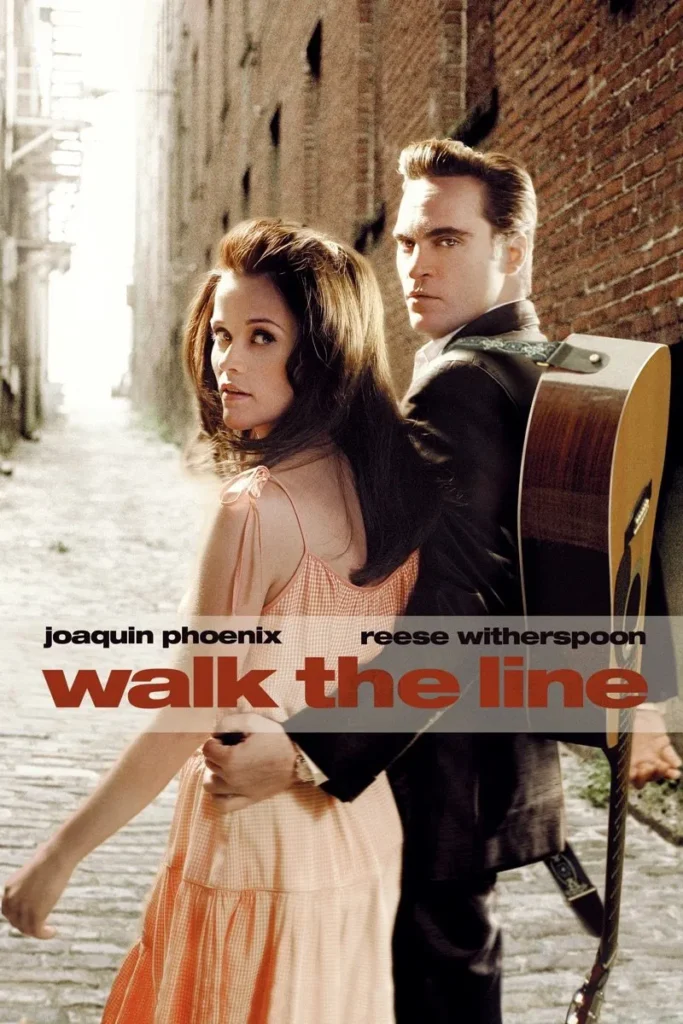
The Plot: Jesus Wore Black
We begin in the American South, where young Johnny (then J.R.) Cash grows up in a shack with more pathos than plumbing. His beloved brother dies in a horrific saw-related accident because apparently subtle metaphors are for cowards. From there it’s a slow chug through grief, a stint in the military, a shotgun wedding and finally: music.
When Johnny walks into Sun Records and mumbles his way through “Folsom Prison Blues,” the universe sighs and says, “Fine. Let him be famous.”
Cue a montage of success, pills and sweating. Lots of sweating. By the halfway point, Phoenix looks like a man who’s just remembered he’s locked inside a musical biopic with no escape.
Joaquin Phoenix: Brooding With Intent
Joaquin Phoenix doesn’t act in this film. He smoulders. Constantly. At every moment. If his performance had any more gravitas, it would collapse into a black hole. He’s less a man and more a haunted southern spectre clutching a guitar like it’s a weapon and a crucifix rolled into one.
He sings too, and frankly, he nails it. There’s a real sense that Phoenix spent a year listening to Johnny Cash records and muttering, “I can do that,” while glaring at himself in the mirror. It’s mesmerising. It’s intense. It’s also occasionally terrifying. You get the feeling he might throw a microphone at someone off-camera if they rustled a crisp packet.
Reese Witherspoon: Weaponised Charm
Enter June Carter, played by Reese Witherspoon, who somehow manages to radiate wholesome Southern charm and steel-spined sass without making you want to throw up. Her Oscar-winning performance turns what could’ve been a simpering love interest into the only adult in the room. She babysits Johnny, sings like a dream and tells him off with such precision you’d swear she was also his therapist, parole officer and guardian angel rolled into one.
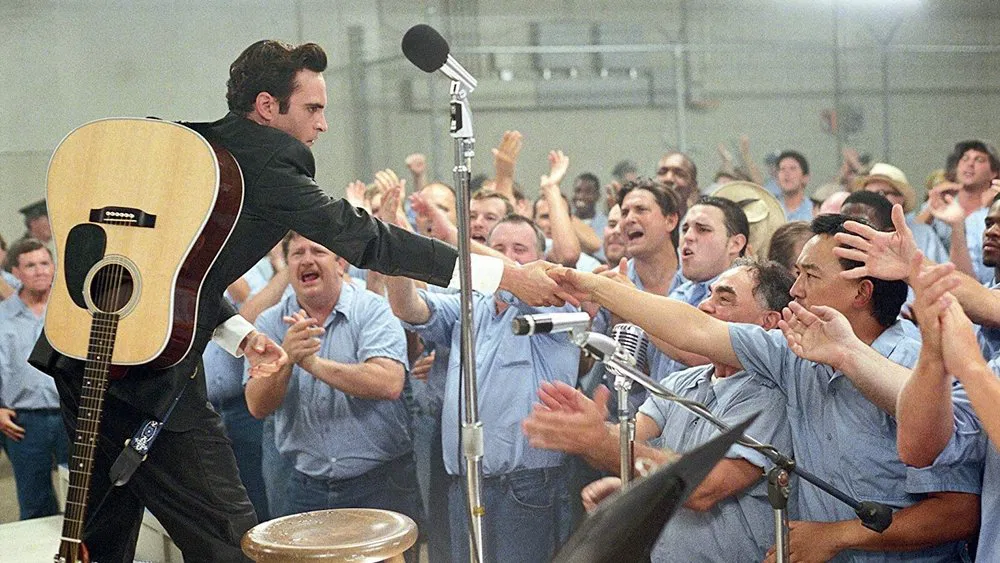
The Music: Now That’s What I Call Emotional Breakdown
The film’s musical numbers are where it really shines. Phoenix and Witherspoon perform all their own vocals, because of course they do. This is Oscar bait, not karaoke. The songs are great, the performances believable and for about two minutes at a time, you almost forget this is a story about a man spiralling into the abyss while wearing a nice shirt.
From “I Walk the Line” to “Ring of Fire,” the hits come thick and fast, like a greatest-hits album curated by someone with a drinking problem and a lot of feelings.
Addiction: The Musical!
By the halfway mark, Johnny is less “rising star” and more “human tire fire.” The film dutifully checks every biopic box: vomiting, shouting, public breakdowns and eventually rehab. Watching him hit rock bottom is both exhausting and strangely comforting. Like, finally, someone else’s life is more of a shambles than yours.
There are pills. There is shouting. There is a scene where he tries to buy property in the middle of a drug-induced fever dream. If you ever wanted to know what it looks like when a country legend tries to self-destruct in slow motion while covered in flop sweat, this is your film.
Romance With a Side of Meltdown
The heart of the story is Johnny’s relationship with June. It’s sweet. It’s tragic. It’s complicated. Like most great love stories, it begins with one person being a complete disaster and the other reluctantly deciding to help clean up the mess. June spends most of the movie staring at Johnny like a mother who’s just found a raccoon in her kitchen and isn’t sure whether to shoo it away or let it stay.
Eventually, there’s a proposal – on stage, naturally – and a marriage that somehow survives a backstory full of legal disputes, addiction and lyrics that mostly sound like confessionals from a man in crisis.
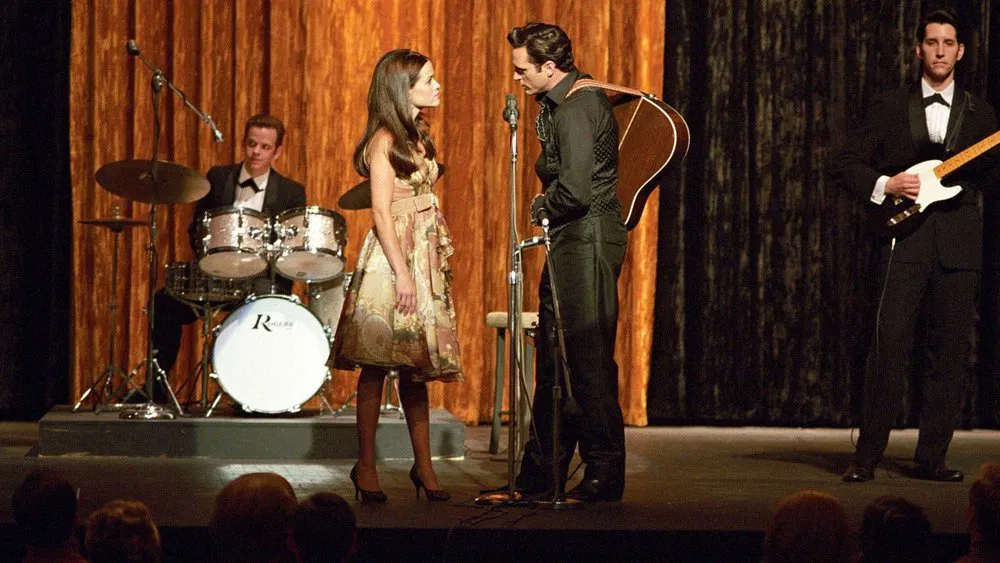
The Aesthetic: Vintage Misery
Visually, Walk the Line is a treat. It bathes in its period details like a hipster in a thrift store. Everything is warm and dusty, like your nan’s attic if she were hiding a bootleg distillery and a tour bus. You can practically smell the sweat-soaked polyester and disappointment.
The cinematography is gorgeous, the costumes impeccable and the lighting so moody it might require therapy.
Oscar Bait? Hell Yes
Let’s not kid ourselves. This film was precision-engineered in a lab to win awards. It has everything the Academy loves: real-life trauma, drug addiction, a transformation-based performance, a musical component and historical gravitas.
And it worked. Reese Witherspoon won Best Actress. Phoenix was nominated but lost, probably because he didn’t gain enough weight or get ugly enough for the statue
Trivia: Useless But Fascinating – Like a Tambourine Solo
- Phoenix and Witherspoon did all their own singing. That’s right. In a world of lip-syncing frauds, these two maniacs actually trained for six months to sound like country royalty. It’s the kind of overachievement that makes you rethink your entire life – or at least your karaoke habits.
- Joaquin broke a rib during rehearsals. Because apparently method acting isn’t complete unless your skeleton files a formal complaint. The injury happened while attempting to recreate Cash’s stage moves. Rock and roll: now with orthopaedic consequences.
- Johnny Cash approved of Phoenix before he died. Cash and June watched some early footage of Walk The Line and gave it their blessing. Then they promptly passed away – probably the only way to avoid seeing their entire lives played back in painfully high-definition anguish. they both passed away in 2003 – within months of each other. Romantic? Yes. Hauntingly on-brand for a country song? Also yes.
- Phoenix went full Cash (minus the cocaine… probably). Joaquin didn’t just play Johnny Cash – he became him, in the way that actors do when they start muttering song lyrics in the shower and staring at guitars like they owe them money. He learned to play guitar and sing like Cash, not as himself, which is essentially like learning to drive by building the car first.
- Witherspoon wasn’t sold on the role — until she won an Oscar. Initially, Reese thought she’d been miscast. Which is fair, considering June Carter is a walking contradiction of southern sweetness and quiet fury. But then she won every award going, so that self-doubt aged about as well as a block of cheese on a radiator.
- Phoenix’s rehab wasn’t just on-screen. During the filming period, he admitted to entering actual rehab – which might explain why he portrayed the breakdowns with such horrifying precision. Sometimes you wonder if he thought the script was a documentary.
My Final Thoughts: Misery With a Melody
Walk the Line is not subtle. It doesn’t whisper, it wails. But for all its grimness, it’s a surprisingly enjoyable ride. The performances are outstanding, the music is superb and the storytelling walks the tightrope between reverent and unflinching.
It might not reinvent the biopic, but it strums it’s familiar chords with enough feeling to make you forgive the predictability. Think of it as the cinematic equivalent of a great country song: heartfelt, melodramatic, a bit self-destructive and guaranteed to leave you crying into your bourbon.

If You Like Walk The Line, I Recommend These Movies:
- Ray (2004) – Jamie Foxx as Ray Charles, in another cautionary tale about genius, women and heroin.
- Bohemian Rhapsody (2018) – Basically Walk the Line but with more sequins and less accuracy.
- Rocketman (2019) – Elton John sings through his trauma like a glitter-covered phoenix rising from a martini glass.

Walk the Line
John R. Cash
June Carter
Vivian Cash
Ray Cash
Sam Phillips
Luther Perkins
Marshall Grant
Carrie Cash



